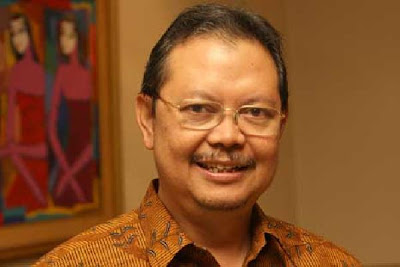The president director of BNI, Sigit Pramono, may be likened to a medical specialist. He has “cured” quite a lot of ailing banks. In 2000, he resolved nonperforming loans at Bank Mandiri. Then in 2002, he restored the financial soundness of Bank Internasional Indonesia (BII), which at the time was near collapse.
After his success at BII, he was assigned in late 2003 to settle fraudulent L/Cs amounting to Rp 1.7 trillion at Bank Negara Indonesia’s Kebayoran Baru branch, South Jakarta.
In fact, when he was appointed president director of BNI, Sigit was still president director of BII. Only a day after his appointment did he hand over his position at BII to Henry Ho Ceong, the new president director appointed at the bank’s extraordinary shareholders meeting.seems that problematic banks are my turf. What else can I say? As it is an assignment, I will perform my duty as best as I can. For me, an assignment is a mandate that must be done wholeheartedly,” he said.
The first step he took when he joined BNI was to revamp the executive structure of the bank, in keeping with the decision made at the bank’s general shareholders meeting. Internally, this revamp was aimed at improving work quality, establishing a service standard and the launch of innovative banking products (such as BNI Emerald) to net as many customers as possible so that the company could reap the biggest profit possible.
Externally, his program was linked to the establishment of harmonious and mutually profitable relations with third parties and investors.
BNI, he said, focused on its restructuring effort in three stages, namely stabilization, recovery and transformation. “Currently, we are at the stage of transformation. At this stage, we would like to see BNI as the best bank in terms of services to customers,” said Sigit, who was once vice president director of Merincorp Bank.
Although the restructuring program of BNI has been going on for only a year, positive results are already apparent. The bank’s profit has risen 278 percent from 2003 to Rp 829 billion. The value of its total assets has also increased 3.8 percent, from Rp 131.5 trillion to Rp 136.5 trillion. Its return on assets (ROA) and return on equity (ROE) have improved.
The value of its ROA has gone up from 0.77 percent to 2.45 percent while its ROE has risen in value from 1.83 percent to 29.64 percent.
It is not easy dealing with problematic banks. “Smart and effective tricks” are needed. Sigit, who is a photo hobbyist and has held a photo exhibition, said a leader must have the ability to motivate and encourage all parties in the organization or company under his leadership to accomplish a common mission and reach a common goal.
“This can be realized by building good communication with all employees in the company, either formally or informally, and also with people outside the company,” he noted.
The communication so established should be harmonious two-way communication to prevent miscommunication and misunderstanding. To this end, for example, employee gatherings and customer gatherings need to be organized up to the branch office level. This, he noted, is important to build trust, both on the part of the employees and the customers. In such activities, he and the members of the board of directors tirelessly explain the banking restructuring program being carried out.
“Nurturing employees’ sense of belonging to the company is also a key to success in managing a company,” said Sigit, who was born in Batang, Central Java, on Nov. 14, 1959. Another thing that contributes to a company’s success is related to a defined job distribution among the company’s human resources. People with high integrity, professionalism and competence should be placed in appropriate positions.
The effort to restructure problematic banks should always concern handling problem loans or low performing loans. This was especially the case when Sigit was entrusted to handle the syndication and division of loan rescue of Bank Export Import (Exim).
This job was tougher as Bank Exim, eventually, had to be merged with a number of state banks – Bank Bumi Daya (BBD), Bank Dagang Negara (BDN) and Bank Pembangunan Indonesia (Bapindo) – to become a new bank called Bank Mandiri. During this time, Sigit had to handle at least 615 large corporate debtors with problem loans and several thousands of medium and small loans.
To deal with bad debtors, Sigit had to put into practice his most effective “trick”. Here his leadership skills were put to the test. “It is in this situation that a leader must be capable of negotiating.
His approach will be to understand what a debtor is experiencing and then find the best solution so that the debtor will be willing to repay the loan,” said Sigit, who learned negotiating skills while working for a joint-venture leasing company established by Bank Exim and Japan’s Sumitomo Bank.
Thanks to his negotiating skills, Bank Mandiri’s bad loans slowly but surely could be settled. Then the “financial condition” of the bank began to improve.
Sigit, who is also chairperson of the Federation of Private Domestic Banks (Perbanas) for the 2006-2009 period, has successfully handled 70 to 80 percent of loan portfolios that need to be restructured and that have, since the early days of the financial crisis, constituted combined loans of the four government banks that merged.
As a result, Sigit has become famous in the banking world. Behind his modest, kind and genial manner, he is in fact a professional banker. Although he holds the top management position, he is quite close to employees at the low level.
As president director, he must be able to make the right decision at the right time. Regarding this, Sigit, who has four children, adheres firmly to the Latin principle primus inter pares (first among equals), and among the board of directors it is he who must have the courage to make a decision, however bitter that decision may be. (Burhan Abe)
The Jakarta Post, June 06, 2007



